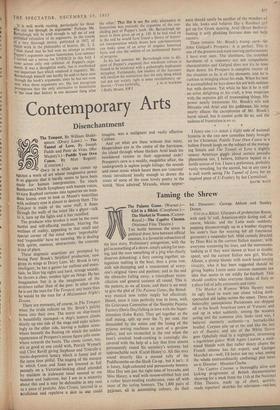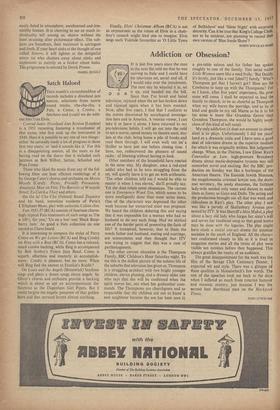Tathing the Shrew
The Pajama Game. (Warner.)— Girl in a Bikini. (Cinephone.)— The Market in Women. (Cameo- Royal.)—The Captive Cinema. (National Film Theatre.) THE battle between the sexes in political dress, love between official enemies, is a favourite subsection of the love story. Preliminary antagonism, with the girl as something of a shrew, simply asking for tam- ing, and the man something of a prig who clearly deserves debunking; a fiery coming together, an- tagonism melting in the heat; then a prize row, with tub-thumping and a restatement of every- one's original views and position; and in the end the obstacles falling away, a triumphant recon- ciliation and general cosiness all round. This is the pattern, as we all know, and there is no need to give the plot of The Pajama Game,. the Broad- way musical now rather stagily but effectively filmed, since it runs perfectly true to form, with the Grievance Committee of the Sleeptite Pajama Factory (Doris Day)falling in love with the Super- intendent (John Raitt). They get together at the staff outing, split up over the 71 per cent. rise demanded by the union and the fusing of the pyjama sewing machines as part of a go-slow policy, and are reconciled in the end when the boss's crooked book-cooking is cunningly dis- covered with the, help of a key that lives almost permanently round his secretary's scrawny but approachable neck (Carol Haney's). All this may sound drearily like a massed rally of the Puddlecombe-on-the-Slush Co-op., but it isn't : it is funny, high-coloured and persuasively bouncy. Miss Day sets just the right tone of bravado, and Miss Haney, a waif with mouse-nibbled hair and a rather heart-rending exuberance, runs off with most of the acting honours. The 1,800 pairs of pyjamas, all in astonishing colours, do their
bit. Directors : George Abbott. and Stanley Donen.
Girl in a Bikini: Glimpses of proletarian Rome, with rock 'n' roll, American-style dating and, of course, bikinis; and the Latin male suddenly popping disconcertingly up in a brother slapping his sister's face for wearing (of all functional garments) a suspender belt. Mild comedy directed, by Dino Risi in the current Italian manner, with everyone screaming his lines, and the movements looking as if they were shown •at least at double speed; and the current Italian new girl, Marisa Allasio, a plump blonde with much head-tossing vivacity, who it has been suggested should be giving Sophia Loren some anxious moments (an idea that seems to me wildly far-fetched). This should confirm what everyone thinks of Italy as a place full of jolly extroverts and ruins.
The Market in Women: White Slavery rears its ugly head to warn one about taking dark- spectacled old ladies across the street. Three un- believably unsuspicious Parisiennes are shipped off to the South American town of `Varacas' and end up in what suddenly, among the wooden acting and the nonsense plot, looks (and was, I believe) sinisterly authentic—a barracks-like brothel. Corpses pile up at the end like the last act of . Hamlet, and one of the Whitt Slaves goes Ophelialy mad in a nightgown, strumming a lugubrious guitar. With Agnes Laurent, a snub- nosed blonde with that rather sleazy charm the French cinema has for export, and Georges Martha! as—well, I'd better not say what, seeing the whole (extraordinarily confusing) plot turns on it. Director : Maurice Cloche.
The Captive Cinema: a thoroughly alive and kicking programme of British documentaries showing for a week from the 11th at the National Film Theatre, made up of short, quickly- made reporters' sketches for television—red-hot,
easily dated in atmosphere, unrehearsed and irre- sistibly human. It is cheering to see so much in- dividuality left among us, shown without the least straining after picturesque effect. The sub- jects are humdrum, their treatment is astringent and fresh. If your heart sinks at the thought of one called Sewers, it will lighten at the delightful sewer rat who chatters away about stinks and explosions as merrily as a broker about leaks. The programme is selected by Derek Prouse.
ISABEL QUIGLY







































 Previous page
Previous page